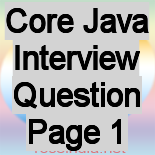Core Java Interview Question Page 1
Question: How could Java classes direct program messages to the system console, but error messages, say to a file?
Answer: The class System has a variable out that represents the standard output, and the variable err that represents the standard error device. By default, they both point at the system console. This how the standard output could be re-directed:
Stream st = new Stream(new FileOutputStream("output.txt")); System.setErr(st); System.setOut(st);
Question: What's the difference between an interface and an abstract class?
Answer: An abstract class may contain code in method bodies, which is not allowed in an interface. With abstract classes, you have to inherit your class from it and Java does not allow multiple inheritance. On the other hand, you can implement multiple interfaces in your class.
Question: Why would you use a synchronized block vs. synchronized method?
Answer: Synchronized blocks place locks for shorter periods than synchronized methods.
Question: Explain the usage of the keyword transient?
Answer: This keyword indicates that the value of this member variable does not have to be serialized with the object. When the class will be de-serialized, this variable will be initialized with a default value of its data type (i.e. zero for integers).
Question: How can you force garbage collection?
Answer: You can't force GC, but could request it by calling System.gc(). JVM does not guarantee that GC will be started immediately.
Question: How do you know if an explicit object casting is needed?
Answer: If you assign a superclass object to a variable of a subclass's data type, you need to do explicit casting. For example:
Object a; Customer b; b = (Customer) a;
When you assign a subclass to a variable having a supeclass type, the casting is performed automatically.
Question: What's the difference between the methods sleep() and wait()
Answer: The code sleep(1000); puts thread aside for exactly one second. The code wait(1000), causes a wait of up to one second. A thread could stop waiting earlier if it receives the notify() or notifyAll() call. The method wait() is defined in the class Object and the method sleep() is defined in the class Thread.
Question: Can you write a Java class that could be used both as an applet as well as an application?
Answer: Yes. Add a main() method to the applet.
Question: What's the difference between constructors and other methods?
Answer: Constructors must have the same name as the class and can not return a value. They are only called once while regular methods could be called many times.
Question: Can you call one constructor from another if a class has multiple constructors
Answer: Yes. Use this() syntax.
Question: Explain the usage of Java packages.
Answer: This is a way to organize files when a project consists of multiple modules. It also helps resolve naming conflicts when different packages have classes with the same names. Packages access level also allows you to protect data from being used by the non-authorized classes.
Question: If a class is located in a package, what do you need to change in the OS environment to be able to use it?
Answer: You need to add a directory or a jar file that contains the package directories to the CLASSPATH environment variable. Let's say a class Employee belongs to a package com.xyz.hr; and is located in the file c:\dev\com\xyz\hr\Employee.java. In this case, you'd need to add c:\dev to the variable CLASSPATH. If this class contains the method main(), you could test it from a command prompt window as follows:
c:\>java com.xyz.hr.Employee
Question: What's the difference between J2SDK 1.5 and J2SDK 5.0?
Answer: There's no difference, Sun Microsystems just re-branded this version.
Question: What would you use to compare two String variables - the operator == or the method equals()?
0
Answer: I'd use the method equals() to compare the values of the Strings and the == to check if two variables point at the same instance of a String object.



